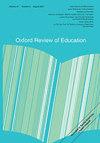原住民遗产作为小学教育的教育资源
IF 2.1
3区 教育学
Q1 EDUCATION & EDUCATIONAL RESEARCH
引用次数: 1
摘要
摘要本文是西班牙拉古纳大学和墨西哥下加利福尼亚自治大学开展的跨大学教育创新项目的成果。这两所学校的学生都在同等水平上学习,以成为未来的小学教育教师,他们分析了加那利群岛和墨西哥小学教科书处理遗产主题的方式。翻转教室和基于项目的学习是主要的教学方法,最终形成了一项期末作业:学生的书面报告。研究结果使我们能够根据这段历史,以及它们在教学和学习过程中的促进作用,重新评估通过教科书传播的知识,并注意它们的认识论偏见。一些主题被强调为使用教科书教授遗产的核心问题:有必要质疑教科书在教学过程中的作用,以及土著遗产在教学中的重要性和遗产的整体概念。在概述大学间教学项目时,文章还展示了对这两种情况下的教科书的分析及其随后的比较,如何重新制定加那利群岛和墨西哥的教育学生如何教授历史。本文章由计算机程序翻译,如有差异,请以英文原文为准。
Indigenous heritage as an educational resource in primary education
ABSTRACT This paper is the result of an inter-university educational innovation project developed between the University of La Laguna (Spain) and the Autonomous University of Baja California (Mexico). Students from both institutions, studying at the equivalent level to become future primary education teachers, analysed the way in which primary school textbooks approach the topic of heritage in the Canary Islands and in Mexico. Flipped classrooms and project-based learning were the main teaching methodologies, culminating in a final assignment: a written report by students. The results enable us to re-evaluate the knowledge transmitted through textbooks in the light of this history, and their facilitation in teaching and learning processes, with attention to their epistemological biases. Several topics were highlighted as core concerns in the use of textbooks for teaching heritage: the need to question the role of the textbook in the teaching process, and the importance of Indigenous heritage when teaching and holistic concept of heritage. In outlining the inter-university teaching project, the article also shows how the analysis of textbooks in both contexts, and their subsequent comparison, has made possible a reformulation of how students of education in the Canary Islands and Mexico are taught to teach history.
求助全文
通过发布文献求助,成功后即可免费获取论文全文。
去求助
来源期刊

Oxford Review of Education
EDUCATION & EDUCATIONAL RESEARCH-
CiteScore
5.20
自引率
0.00%
发文量
39
期刊介绍:
The Oxford Review of Education is a well established journal with an extensive international readership. It is committed to deploying the resources of a wide range of academic disciplines in the service of educational scholarship, and the Editors welcome articles reporting significant new research as well as contributions of a more analytic or reflective nature. The membership of the editorial board reflects these emphases, which have remained characteristic of the Review since its foundation. The Review seeks to preserve the highest standards of professional scholarship in education, while also seeking to publish articles which will be of interest and utility to a wider public, including policy makers.
 求助内容:
求助内容: 应助结果提醒方式:
应助结果提醒方式:


